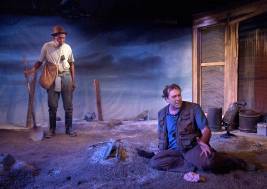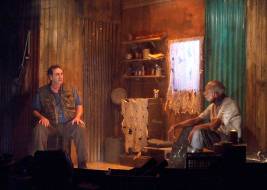RECOMMENDED
The partnership of Athol Fugard and The Fountain Theatre has possibly led to more awards and award nominations than any ongoing collaboration between writer and theater in the Los Angeles area. Fountain productions of Fugard’s The Road To Mecca, Exits And Entrances, Victory, and Coming Home have won raves from local reviewers and numerous Ovations and LADCC awards, among others. The arrival of Fugard’s latest, The Train Driver, a work the playwright describes as “the most important play I’ve written” therefore seemed a good opportunity to see what all the kudos have been about.
The Fountain Theatre production of The Train Driver is beautifully acted, directed, and designed. That being said, Fugard’s latest drama proved too talky to engage me, despite its brief seventy-five minute running time and a plot hook that ought to have been more compelling than it ended up being.
For those who may be unfamiliar with him, Fugard is a white South African playwright who has written extensively about the tragic impact of Apartheid on his country, even now, a quarter century after it termination. The Train Driver takes as its inspiration a brief newspaper item Fugard read about a black South African mother who grabbed her three children and pulled them onto the railroad tracks in front of an oncoming train. In the playwright’s fictionalization, the mother remains, though she is holding only a single infant child when pulverized by the impact of the oncoming train, her proximity to the approaching engine making it physically impossible for the train driver to stop in time.
We meet Roelf (Morlan Higgins), the title character of The Train Driver, when he arrives at the dusty, junk-cluttered, cross-free, spread of dirt that serves as a graveyard for blacks who have died and been buried without ever having been identified. What he sees horrifies him and fills him with even more guilt than he already feels, despite the knowledge that he was not to blame for the woman and child’s death. How is it possible, he asks himself, that people in his country continue to live in such abject poverty? Where are the crosses that ought to mark each grave? Why are abandoned hubcaps and car mufflers strewn atop the parched earth that takes the place of well-watered and tended grass in this graveyard from hell?
Narrating The Train Driver’s story is Simon (Adolphus Ward), the elderly black man whose job it is to dig graves for the unknown “sleeping” souls and protect them from the wild animals that would like nothing more than to find and devour them. Simon tries to answer the questions that are consuming Roelf, and their conversations and soliloquies serve as a metaphor for Apartheid and the guilt that many white South Africans may still feel about their complicity in it, or their failure to stop it during the forty-six years that it stood as the law of the land.
Unfortunately, for this reviewer at least, The Train Driver proved endlessly wordy, and despite Higgins and Ward’s outstanding work, neither Roelf nor Simon were characters whose suffering I could identify with. South African accents and considerable use of native vocabulary did not help.
Higgins and Ward give performances that transcend “acting” and enter the realm of simply being. Look at the filthy, sweaty lug that is Roelf and you will find it almost impossible to believe that this is an actor playing a role, and an American actor at that. The same can be said for the wide-eyed, stoop-shouldered Simon, brought to vivid life by Ward, whose starring roles in a pair of August Wilson plays at the Fountain have earned him numerous awards. For Higgins’ and Ward’s performances alone, and for Stephen Sachs’ nuanced direction, many theatergoers are sure to find The Train Driver worth seeing.
Then there is the production design, with Ovation, LADCC, and Scenie-winning set designer Jeff McLaughlin once again achieving the seemingly impossible, this time transforming an intimate, black box theater into a South African graveyard, the stage floor hidden by layers of dirt, the audience surrounded by the African sky. Ken Booth’s lighting is equally superb, and when the lights go up inside Simon’s shack, its exterior wall turns out to be a scrim which disappears when lit from within, allowing us to follow Simon and Roelf both inside and out. Dana Rebecca Woods’ costumes have been so believably “distressed” to look as old and filthy and worn as Roelf’s and Simon’s would certainly be. David B. Marling’s evocative sound design fills the Fountain with the sounds of the South African night and at the play’s most powerful moment, with the roar of an approaching train. Kudos go too to props master Shannon Dedman, dialect coach JB Blanc, technical director Scott Tuomey, and production stage manager Elna Kordijan.
I wanted to love The Train Driver as much as my guest (and certainly many in the audience) did. With such impeccable performances and design, it may be worth checking Fugard’s latest at the Fountain. If only the play itself had made me want to return for more.
The Fountain Theatre, 5060 Fountain Ave., Los Angeles.
www.FountainTheatre.com
–Steven Stanley
October 21, 2010
Photos: Ed Krieger





 Since 2007, Steven Stanley's StageSceneLA.com has spotlighted the best in Southern California theater via reviews, interviews, and its annual StageSceneLA Scenies.
Since 2007, Steven Stanley's StageSceneLA.com has spotlighted the best in Southern California theater via reviews, interviews, and its annual StageSceneLA Scenies.







 COPYRIGHT 2024 STEVEN STANLEY :: DESIGN BY
COPYRIGHT 2024 STEVEN STANLEY :: DESIGN BY